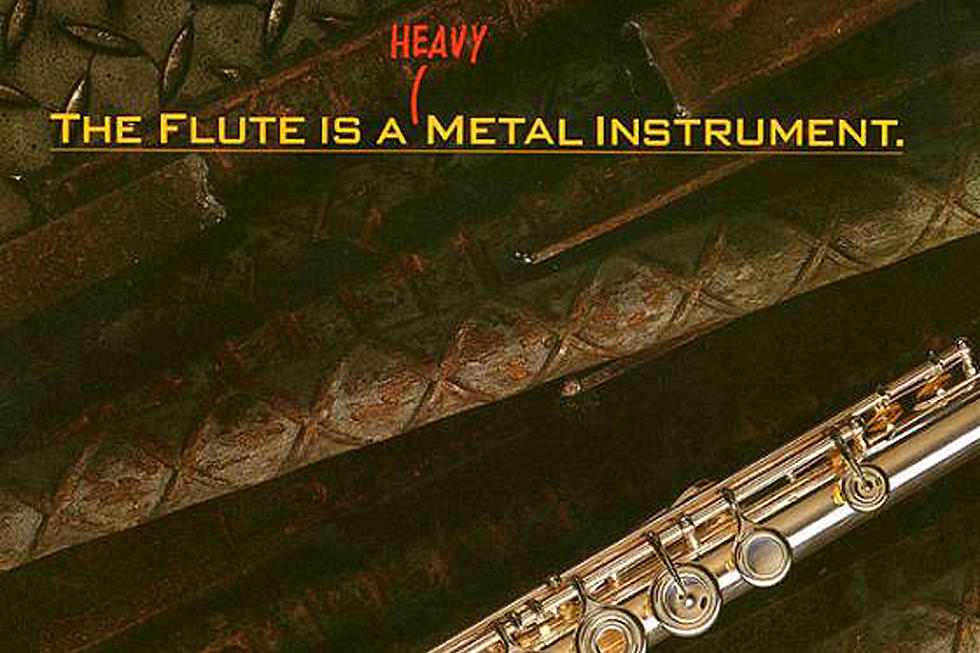
How Jethro Tull’s Flute Became a ‘Heavy Metal Instrument’
Chrysalis Records' advertisement congratulating Jethro Tull on winning a 1989 Grammy contained an in-joke, as their label impishly noted that the flute played by frontman Ian Anderson is "a (heavy) metal instrument."
Tull had just unexpectedly claimed an award in the newly established Best Hard Rock/Heavy Metal Recording category for 1987's Crest of a Knave. The other nominees included AC/DC, Iggy Pop, Jane's Addiction and the heavily favored Metallica.
Lars Ulrich would later admit that Metallica assumed the trophy was theirs. Even members of Jethro Tull and their record label figured this outcome was inevitable, so everyone involved was stunned.
Anderson joined UCR via Zoom on the eve of the release of Jethro Tull's newest album, RokFlote, to discuss his memories of the Grammy fiasco.
Jethro Tull winning the Best Hard Rock/Heavy Metal Recording award at the Grammys in 1989 is legendary. I appreciate the sense of humor your record label had when they placed an ad after the fact calling the flute a heavy metal instrument.
It needed to have a sense of humor because right at the beginning of the Grammy procedure where we were offered up with many other bands as potential nominees, we were selected as one of the five nominees in the new category, Best Hard Rock/Heavy Metal Recording. At that point, it just seemed ridiculous. No one took it seriously, because they thought, “Jethro Tull? No, no. But Metallica? Yeah.” Maybe Jane’s Addiction or Iggy Pop, but all of the money was on Metallica who had just had a huge album [with] instant success and were the big new band. So no one griped or moaned about Jethro Tull being nominated because they thought we [didn’t] have a cat in hell’s chance. The record company believed that too.
When I said, “Well, do we have to go to Los Angeles to this thing?” They said, “No, don’t bother. It’s not worth you guys coming over, because that’s just wasting airfares and hotels. You’re not going to win. Metallica is going to win.” I said, “Okay, fine.” I got a phone call on the night from our PR guy at the record company saying, “Oh, guess what, you won the Grammy!” and we were in the middle of a recording session at that point late at night in the U.K. I said, “Oh yeah? Well, that’s nice!” That was it. I told the other guys, “Well, apparently we won the Grammy in this unlikely category.” It wasn’t really until the next day or the day after when the furor of unpleasantness hit the media and I realized that it was something that had really upset people. Not only the fans of Metallica, but they felt that somehow the Grammy system had been devalued by us winning in a category that we really shouldn’t be in.
I thought, “Well, you’ve got to be upbeat about it.” I said to people at the time, “If they come up with a new category next year called Best One-Legged Flute Player, then hell, I’m going to win every year!” I was not trying to make fun of it, but make light of it. Metallica subsequently did too. Chris Wright, the founding partner of Chrysalis Records, is the one who came up with the idea for the ad, “The flute is a heavy metal instrument.” That’s what went in Billboard and it was just a bit of fun. But anyway, Metallica seemed pretty okay about it. They didn’t get too bent out of shape. As I said at the time, “Don’t worry, guys, you’re going to win the Grammy next year!” And they did! So everything was fine.
Listen to Metallica Discuss Jethro Tull's Grammy Victory
The Metallica guys are music fans too.
Apparently one of them … [Metallica guitarist] Kirk Hammett, he didn’t become a Jethro Tull fan until relatively recently when he came to look at Jethro Tull’s music and then decided, “Wow, I really like this.” But I don’t think they were at the time. That’s great because I too have done that with people I had no interest in. You know, I’d vaguely heard [the music] and thought, “No, this is not for me.” Many years, decades later, something prompts me to listen to their music. I discover some really positive things about it and I get really immersed in it. Weeks ago, I immersed myself in Morrissey’s music. I’m a huge fan now. I think it’s a good thing that you can realize later on that something has some great merit that you just didn’t appreciate at the time. Somehow, with the passing of the years, it distills into a genuine appreciation for somebody’s creative and performance skills.
It’s not the first time it’s happened to me. It’s happened a few times with a number of other artists, particularly from an era where I wasn’t listening to music anymore. Really, from the mid-’70s onwards, I find myself catching up much, much later on with Foreigner, particularly Lou Gramm’s brilliant vocals. I didn’t really start listening to Foreigner until about four or five years ago. Marc Almond from Soft Cell, I really didn’t know him at all and then I did get to know his music and him, and we’ve been playing together in concerts for several years now and we’re big buddies. I think it’s nice when that happens, when you find stuff that you can really build a strong appreciation for, in spite of your perhaps rather cavalier dismissal of it at a point when it had its heyday.
I guess it’s a bit like that with Kirk Hammett and Jethro Tull. You come to it late in life, but it actually means more, because you have that objectivity of having it all laid out before you in a catalog, the discography, you can take it all in. It’s like that with classical music, for goodness sake. We weren’t around when Beethoven was composing his symphonies. [Laughs] We’re all catching up late in the day, whether we’re old guys or young guys. We catch up on that great tradition of classical music long after the composer is dead and gone.
Listen to Jethro Tull's 'Cross-Eyed Mary'
The next year after the Jethro Tull Grammy win, the organization split the award into two separate categories, Hard Rock and Heavy Metal, ostensibly to keep it from ever happening again. Looking at those two categories, it does feel like Jethro Tull could have been categorized as hard rock early on.
I think very much so. I think there was a degree of hard rock going on pretty early on in Jethro Tull’s activities. On the Aqualung album, “Cross-Eyed Mary,” for example, is something that’s definitely on the hard side of rock. Well, it must have been, because Iron Maiden covered it. Bruce Dickinson was enamored with that song, so they gave it probably more of a heavy metal treatment. But yes, I think Jethro Tull has had an element of hard rock here and there along the way fairly consistently. But there are also albums that are focused more on acoustic music or folk music.
Basically, the only category that Jethro Tull should win in is the Bunch of Nice Guys Who Haven’t Won a Grammy Before category. If they come up with that one, we’ll have a chance, since I don’t think the One-Legged Flute Player idea will appeal to the powers that be. At this stage in the game, I have to say, the Grammy thing in America, a bit like the [Rock & Roll] Hall of Fame, these are American institutions about Americana. I don’t think, in all honesty, that Jethro Tull belongs in that sort of a world.
I don’t feel like I’m a product in any way of Americana. You know, people say, “You haven’t been inducted into the Hall of Fame.” I’d have to say, “We don’t belong in the Hall of Fame.” The Hall of Fame should be inducting countless American artists who have yet been unnoticed – unsung and unrepresented – before you start digging around in what’s left to try and find some U.K. wacko band like Jethro Tull. [Laughs] I mean, we don’t belong in there at all.
Jethro Tull Albums Ranked
Behind the Scenes of Metallica's Crazy Tour With Guns N' Roses



